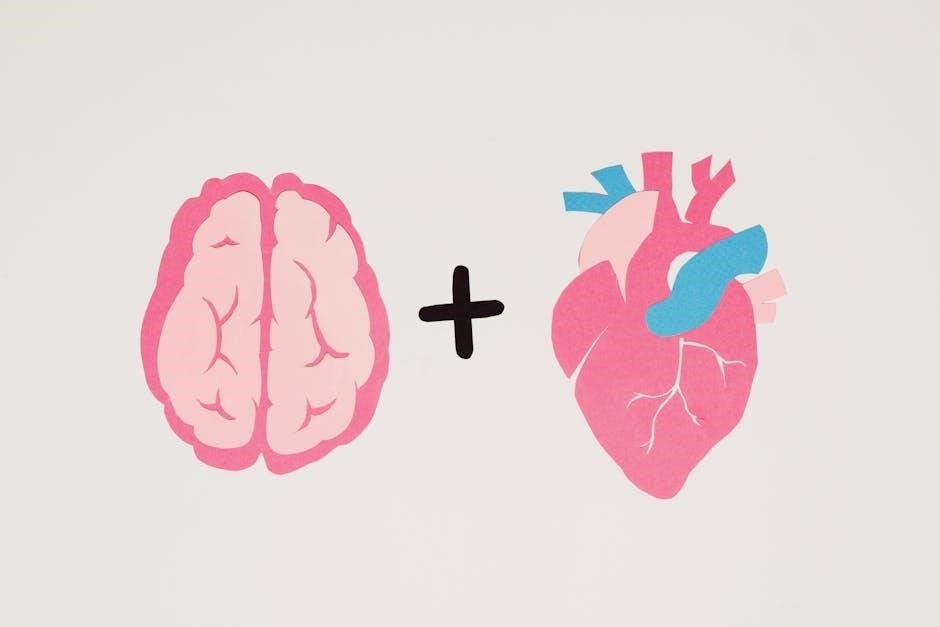Emotional Intelligence is a transformative concept popularized by Daniel Goleman in his 1995 book. It involves self-awareness, self-regulation, motivation, empathy, and social skills, significantly enhancing personal and organizational growth.
The Origin of Emotional Intelligence
Emotional Intelligence (EI) was first conceptualized by psychologists Peter Salovey and John Mayer in the early 1990s. They defined EI as the ability to recognize, understand, and manage one’s own emotions and those of others. Their work laid the foundation for Daniel Goleman, who popularized the concept in his 1995 book Emotional Intelligence. Goleman expanded on their theory, emphasizing how EI influences personal and professional success. This shift in understanding intelligence beyond traditional IQ marked a significant turning point in psychology and leadership development.
Daniel Goleman’s Role in Popularizing Emotional Intelligence
Daniel Goleman played a pivotal role in bringing Emotional Intelligence (EI) to the mainstream. His 1995 book, Emotional Intelligence: Why It Can Matter More Than IQ, made EI accessible to a broad audience. Goleman’s work highlighted the importance of EI in personal and professional success, challenging the traditional view that IQ was the sole determinant of achievement. His engaging writing style and real-world examples helped bridge the gap between academic research and practical application, making EI a household term and reshaping conversations about leadership, education, and human behavior.

The Core Components of Emotional Intelligence
Emotional Intelligence consists of five key components: self-awareness, self-regulation, motivation, empathy, and social skills, as outlined by Daniel Goleman in his groundbreaking work.
Self-Awareness and Self-Regulation
Daniel Goleman emphasizes self-awareness as the foundation of emotional intelligence, enabling individuals to recognize and understand their emotions. Self-regulation follows, allowing them to manage emotions effectively, ensuring emotional balance and reducing impulsiveness. Together, these components foster resilience, adaptability, and a calm disposition, crucial for personal and professional well-being. Goleman’s work highlights how mastering these skills can lead to better decision-making and enhanced relationships by controlling emotional responses and maintaining composure under stress.
Motivation, Empathy, and Social Skills
Motivation, empathy, and social skills are key components of emotional intelligence, as outlined by Daniel Goleman. Motivation involves driving oneself toward goals and being resilient in the face of challenges. Empathy enables understanding and sharing others’ emotions, fostering compassion and strong relationships. Social skills encompass effective communication and collaboration, ensuring harmonious interactions. Together, these traits enhance leadership, teamwork, and personal connections, making them vital for both professional success and emotional well-being.

The Debate: Emotional Intelligence vs. IQ
Daniel Goleman’s work sparks the debate between emotional intelligence and IQ, emphasizing EQ’s role in personal and professional success.
Why Emotional Intelligence Can Matter More Than IQ
Daniel Goleman argues that emotional intelligence (EI) often outweighs IQ in determining success. While IQ predicts academic and professional potential, EI drives interpersonal skills, empathy, and self-management. Goleman contends that high EI fosters better relationships, decision-making, and emotional resilience, which are critical in leadership and personal growth. Unlike IQ, EI can be developed and improved, making it a powerful tool for long-term achievement and well-being.
Applications of Emotional Intelligence
Emotional intelligence enhances communication, conflict resolution, and collaboration in education, workplace, and personal relationships, fostering better teamwork and leadership, as highlighted in Goleman’s work.
Education, Workplace, and Personal Relationships
Emotional intelligence enhances communication and collaboration across various settings. In education, it fosters better learning environments and student-teacher relationships. In the workplace, it improves teamwork, conflict resolution, and leadership, driving productivity and employee satisfaction. In personal relationships, EI builds stronger, more empathetic connections, reducing misunderstandings and fostering trust. Goleman’s insights reveal how emotional awareness and social skills can transform interactions, creating harmonious and resilient relationships in all areas of life, ultimately contributing to personal and professional success. These applications highlight EI’s universal relevance and transformative power.
Emotional Intelligence in Leadership
Emotional intelligence empowers leaders to inspire and transform organizations. It enhances self-awareness, empathy, and social skills, fostering collaboration and driving success. Goleman’s insights highlight its transformative power.
Leadership Development and Organizational Transformation
Daniel Goleman’s work highlights how emotional intelligence transforms leadership and organizations. Leaders with high EI foster collaboration, innovation, and trust, driving organizational success. By cultivating self-awareness, empathy, and social skills, they inspire change and create positive work environments. Goleman’s insights emphasize that emotionally intelligent leaders not only achieve personal growth but also propel their organizations toward sustainable transformation and cultural excellence, making EI a cornerstone of modern leadership development.

The Impact of Low Emotional Intelligence
Low emotional intelligence can lead to mental health issues, interpersonal conflicts, and poor decision-making. It often results in unmanaged stress, emotional turmoil, and strained relationships, as highlighted by Goleman.
Mental Health and Interpersonal Conflicts
Low emotional intelligence is linked to mental health challenges such as depression, anxiety, and unmanaged stress. It can escalate interpersonal conflicts due to poor emotional regulation and empathy deficits. Goleman highlights how deficiencies in EI lead to heightened risks of violence, eating disorders, and substance abuse. These issues often stem from an inability to manage emotions and respond constructively to social cues, creating a cycle of conflict and isolation. Addressing these challenges requires developing self-awareness and emotional management skills to foster healthier relationships and mental well-being.

Criticisms of Daniel Goleman’s Theory
Goleman’s work has faced criticism for oversimplifying complex psychological concepts and misinterpreting research. Some argue his theories ignore genetic determinism and lack strong scientific backing.
Scientific Critique and Misinterpretation of Research
Goleman’s work has been criticized for oversimplifying emotional intelligence and misinterpreting scientific studies. Critics argue his theories lack empirical support and ignore genetic determinism. A PDF critique highlights how Goleman’s approach disregards the genetic influence on intelligence and personality, undermining his claims. His model, while popular, is seen as overly broad, leading to concerns about its scientific validity. This misinterpretation of research has sparked debate, with some questioning the practical applications of his theories in real-world scenarios.
Resources for Further Learning
Download the 25th-anniversary edition of Daniel Goleman’s Emotional Intelligence as a PDF for insights into EQ’s impact on success. Explore related books and summaries for deeper understanding.
PDF Summaries, Downloads, and Related Books
Access comprehensive PDF summaries and full downloads of Daniel Goleman’s Emotional Intelligence, including its 25th-anniversary edition. Explore related books like Primal Leadership for deeper insights into EQ applications. These resources offer practical strategies for enhancing emotional intelligence, making them invaluable for personal and professional development. Download free PDFs or purchase detailed summaries to gain a deeper understanding of Goleman’s groundbreaking work and its real-world implications.
The Evolution of Emotional Intelligence
Emotional Intelligence evolved from a niche concept to a global phenomenon, gaining widespread recognition through Daniel Goleman’s work, transforming it into a cultural staple for personal and professional growth.
From Concept to Cultural Staple
Emotional Intelligence has transitioned from a psychological concept to a widely accepted framework for personal and professional development. Daniel Goleman’s work played a pivotal role in popularizing EI, transforming it into a cultural phenomenon. His 1995 book introduced the five key components of EI—self-awareness, self-regulation, motivation, empathy, and social skills—and demonstrated their application across education, workplace, and leadership. This shift has led to EI being recognized as a critical factor for success, influencing how individuals and organizations approach interpersonal dynamics and decision-making, solidifying its place in modern culture and professional practices.
Emotional Intelligence is now a cornerstone of modern personal and professional development, reshaping how we understand emotions, relationships, and leadership, ensuring its lasting relevance and impact.
The Relevance of Emotional Intelligence in the Modern World
Emotional Intelligence is crucial in today’s fast-paced, interconnected world, where managing stress, building strong relationships, and making ethical decisions are paramount. As technology advances, EI helps individuals navigate complex social dynamics, fostering empathy and collaboration. It enhances leadership, mental well-being, and personal growth, making it indispensable for both personal and professional success. By cultivating EI, individuals can better adapt to change, communicate effectively, and thrive in diverse environments, ensuring its continued relevance in shaping a more emotionally aware and resilient global community.
